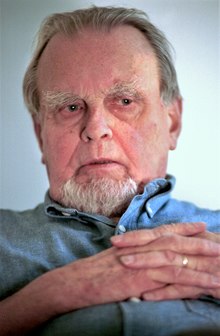The 1980 Nobel Prize in Literature was awarded the Polish-American poet and prose writer Czesław Miłosz (1911–2004) "who with uncompromising clear-sightedness voices man's exposed condition in a world of severe conflicts."[1][2]
| Czesław Miłosz | |
 "who with uncompromising clear-sightedness voices man's exposed condition in a world of severe conflicts" | |
| Date |
|
| Location | Stockholm, Sweden |
| Presented by | Swedish Academy |
| First awarded | 1901 |
| Website | Official website |
Laureate
editCzeslaw Miłosz was primarily a poet. In 1934, he released his first poetry collection, Poemat o czasie zastygłym ("A Poem on Frozen Time"). His early works frequently have a sense of impending doom, but as time went on, he softened the worldly image he painted. His best-known work, the non-fiction Zniewolony umysł ("The Captive Mind", 1953), explores the effects of an oppressive system on four authors. Miłosz fought against being branded a political writer and maintained that his works addressed eternal questions like life and death, faith and doubt, and good and evil. His other celebrated poetry collections include Ocalenie ("Rescue", 1945), Traktat poetycki ("A Treatise on Poetry", 1957), Gdzie wschodzi słońce i kędy zapada ("Where the Sun Rises and Where it Sets", 1974).[3][4]
References
edit- ^ The Nobel Prize in Literature 1980 nobelprize.org
- ^ William Borders (10 October 1980). "Polish Poet in U.S. Gets Nobel in Literature". New York Times.
- ^ "Czeslaw Miłosz". Encyclopedia Britannica.
- ^ Czeslaw Milosz – Facts nobelprize.org
External links
edit- 1980 Press release nobelprize.org